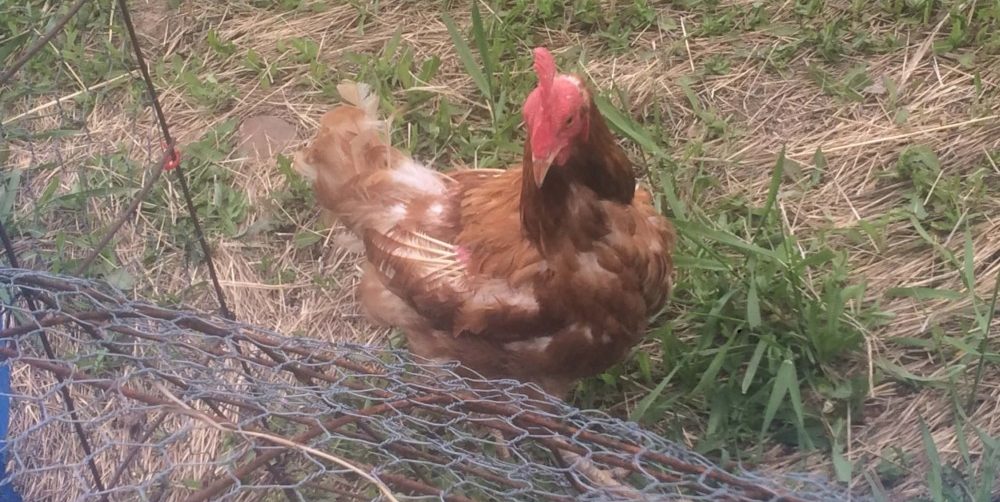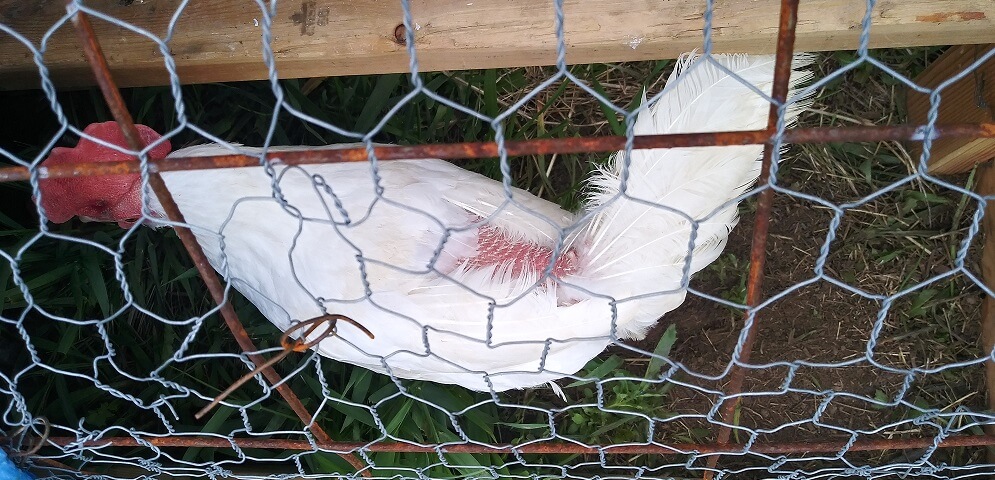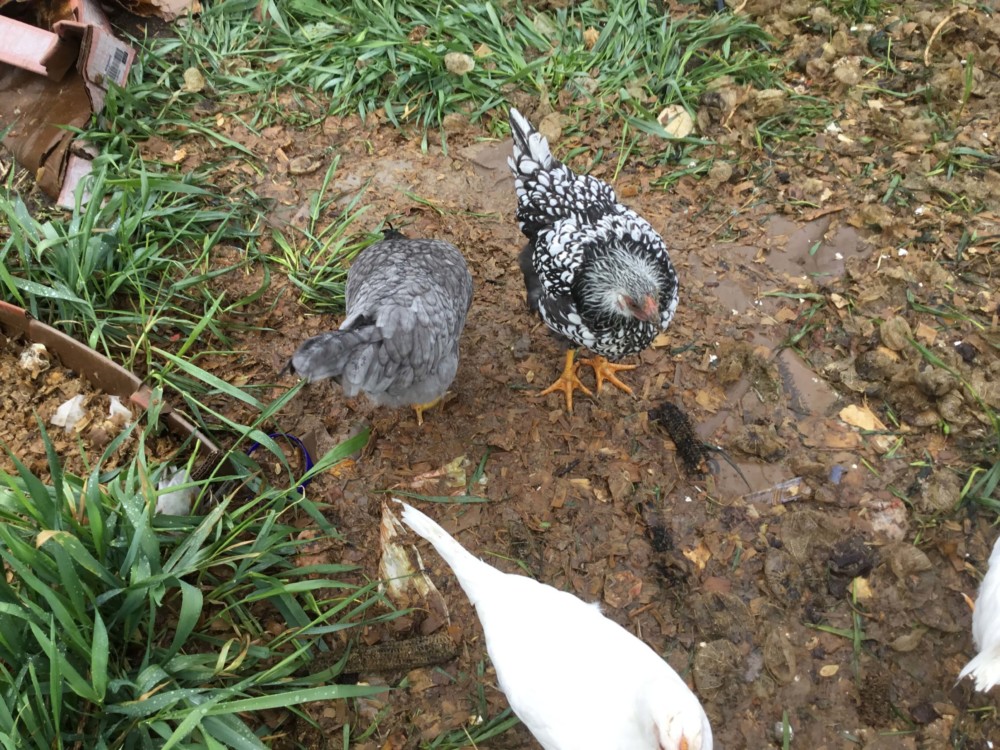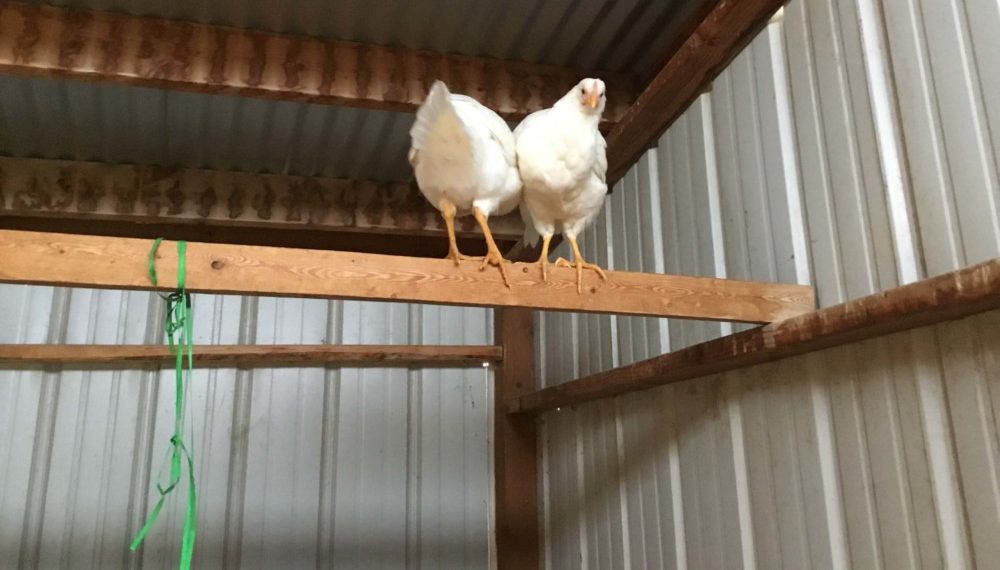Why Does My Chicken Not Have Butt Feathers

The first time it happens, it's alarming. A chicken that's losing its feathers looks sickly and unhappy. It has caused many a chicken raiser concern. The loss of a chicken's feathers may or may not be because of something more serious, but regardless of the reason, the loss of a chicken's feathers should not be ignored.
Why do chickens lose their feathers?
- Molting
- Not Enough Protein in the Diet
- Self-inflicted feather loss from stress
- Extreme Heat
- Broodiness
- Mites and Lice
- Picking by Bullies
- Vent Gleet
- Overbreeding by Roosters
If your chicken is losing feathers, it may be a completely normal and healthy thing that is happening, but there are some unhealthy circumstances that can cause it as well. Continue reading to learn more about the reasons chickens lose their feathers and how you can help keep your chicken from losing feathers.
1. Molting
Chickens molt on a regular basis, usually once a year. Chickens usually molt as the days get colder and shorter. It's a way that they prepare for winter.
While a chicken is molting, they usually stop laying eggs and start to store up nutrients.
Molting is when chickens lose old feathers and then will grow new feathers to replace the old ones. This is like when people lose skin cells or hair. Feathers are 85% protein and molting changes the temporary dietary needs of chickens.
There are two types of molting; a soft molt and a hard molt. A soft molt may be hardly noticeable and the chicken may only lose a few feathers at a time.
But, a hard molt makes the chicken look like it's been severely plucked. It can have large patches of bare skin showing.
When chickens have more protein in their diet, their molting may not be as intense. People who own chickens and give their chickens a more balanced protein diet report less molting.
If your chicken is molting, it's a good idea to move them to a diet that's higher in protein. Feathers take an immense amount of protein to build. Feed your chickens a diet that has 20% protein in it. You can also give your molting chickens added protein by providing them with cooked meat, boiled eggs, and oatmeal.
Or, check out this article on other ways to get cheap protein for your chickens' diet.
2. Not Enough Protein in the Diet
Chickens will lose more feathers when they have a severe deficiency of protein in their diet.
Some chicken owners allow their chickens to forage for 100% of their diet, while others primarily feed their chickens from a commercial feed.
There are benefits of both. Foraging chickens often have a diet with more nutrients than those who rely mostly on commercial feed.
But, sometimes chickens aren't able to forage sufficiently for their diet needs. If your chickens seem to be losing their feathers, it may help them to have some of their diets supplemented. This can ease the food stress they may be feeling and also provide needed nutrients and protein for feathers.
3. Self-inflicted Feather Loss From Stress
Chickens experience stress. And when chickens are upset, they will pull out their own feathers.
There are two main reasons for stress:
Overcrowding and fear are the most common causes of stress in a flock. If your chickens have recently had a scare, been attacked, or faced another stressful situation, you may see many of them start to look a little ruffled with feathers missing.
They are chickens, and well, chickens don't have the greatest courage.

To protect chickens from predators or other stresses, such as heat and overcrowding…
- Make sure the pen you have created has enough room
- Coops should have an average of 2-4 feet of space per chicken (more if the chickens don't have a run to be in during the day)
- Chicken runs should have an average of 10 feet of space per chicken
- Don't have too many chickens for the space.
- Protect the area from the sides and the top.
- React when you hear the chickens get upset
Stress can also cause extreme bullying, which I will cover later in the article.
4. Extreme Heat
Extreme heat will also cause undue stress. Freshwater makes a world of difference for the chickens.
Chickens should always have access to water. Water is the most effective way for a chicken to regulate its body temperature. This is true in both hot weather and cold weather.
Chickens will die easily and get sick without enough water. But, even with water, extreme heat can still stress your flock out.
There are many things you can do to help your hens out.
When it's hot outside, feed your chickens frozen watermelon and other frozen treats to keep cool.
Make sure your girls have plenty of shade. Bushes, trees, and even plywood leaning against the coop can provide extra shade for hot days.
5. Broodiness
A broody chicken is when a chicken wants to hatch her eggs. She sits on her eggs and stops laying.
Check out this article on how to stop broodiness in your hens.
But, broodiness can also cause stress to a hen. She may begin to pluck off her own feathers, which is not healthy behavior.
6. Extreme Bullying
Chickens have a pecking order. They peck at each other to establish dominance in the flock. Once the pecking order is established, the pecking generally drops dramatically, until a change in the flock occurs.
This can happen when a new chicken is introduced, or if a dominant chicken gets sick.
But, the pecking order is different than bullying. Bullying is an extreme pecking that can keep chickens from food or water. It can cause harm to chickens, and in some cases, can lead to cannibalism.
If the bullying leads to blood on the picked up chicken, it triggers an instinct in the other chickens to attract the blood.
I have even seen injured chickens pecking at their own wounds. (Hydrogen peroxide is helpful here. You can use it to disinfect the wound and it changes the color of the blood to a brown.)
You can often reform a bully chicken. I have had to reform several bullies. Check out this article on how to deal with bullies and drop them a little lower on the pecking order.

I've mentioned this before, but too many chickens in too little of space will almost always lead to bullying. One of the first steps to stopping bullying is to make sure you provide enough space for your chickens to hang out.
It also gives plenty of places for bullied chickens to run and hide from bullies.
Another important step is to make sure that you provide multiple places for chickens to access food and water. That way, if a bully tries to keep a hen away from food, she has other places to access food.
7. Mites and Lice
Parasites such as lice and mites can cause chickens to lose their feathers. The main parasite to cause feather loss is the red mite.
The red mite is the biggest threat to the chicken and will cause them to lose the most feathers.
However, they are not that common in smaller flocks.
The red mite is more common when chickens are overcrowded and in larger pent up communities.

You can help to alleviate a mite problem with your chickens by providing them with plenty of dirt for dust baths. You can also use dichotomous earth sprinkled in their bedding.
DE kills mites and helps to rid chickens of the pests. It's made from ground-up marine shells and cuts through most insects exoskeleton.
8. Vent Gleet Or Other Infections
Vent Gleet is an infection around a chicken's vent. A chicken's vent is the backside when the chicken lays eggs.
The chicken will start losing feathers in this area and then also have a white discharge as well. The discharge will smell like yeast that has begun to ferment.
Your hen may look like it has a swollen red butt. It's not very becoming.
Vent gleet is caused by unsanitary conditions, dirty water, or eating stale corn.
Any chickens can get vent gleet, but it is also preventable by changing the water often, keeping the chicken coop area clean and offering chickens a balanced diet of more than corn.
If a chicken does contract vent gleet, the best solution is to keep the chicken's infected area clean and dry, avoid watery foods, and give medicine prescribed by a veterinarian.
9. Over-mating by Roosters
A very aggressive rooster that is constantly on the back of a hen can cause the loss of feathers. This can be very serious if the feather loss goes all the way down to the skin.
The feather loss, in this case, can be continuous and cause infections in the skin.
An aggressive rooster that is causing problems such as feather loss with the hens, should be separated from the hens or removed permanently from the flock.
Another thing to keep in mind is that it's not super healthy for a rooster-hen ratio to be 1:1.
A good ratio is 4-5 hens for every single rooster. But, you can also have a single rooster in a whole flock of hens. It's just important not to have too many roosters per hen.
How do You Stop Your Chickens From Losing Feathers?
When chickens lose their feathers, it usually begins from some kind of stress or illness due to a parasite or predator.
How can you stop your chickens from losing feathers?
Chicken owners are able to help their chickens stop losing feathers by keeping their pens clean, help keep the hens free from stress, and maintain fresh food and water.
Last summer, I adopted a flock of chickens that had stopped laying for their owners. I added them to my existing flock of young chickens.
It was an adventure!
5 of the chickens showed signs of extreme stress or bullying. I took them home and set them free in a large chicken run- about ¼-½ of an acre. It was a big as most suburban backyards.
I also used 2 chicken tractors, in addition to the coop, to house all the chickens up at night. This allowed my older chickens to get used to the newer chickens without bullying my young chickens at night.
Plus, the third chicken tractor, I used to isolate either injured chickens or to reform bully chickens.
It took me about a month, but I managed to reform the bullies.
It took another 2 months for the feathers on the stressed chickens to grow back. I also provided added feed at the end of the day to help supplement their diets.

Not only did the chickens' feathers grow back, but most of them started laying eggs again. It appears they had stopped due to stress and bullying.
So, if it takes a little while for your chickens to recover after you've provided solutions, be patient. Feathers take a little work to make.
10 Things You Can Do To Stop Your Chickens From Losing Their Feathers:
- Make Sure They Have Plenty of Space To Roam Around
- Provide Entertainment To Warn off Boredom
- Keep Their Coop And Nesting Boxes Clean
- Provide Enough Roosts For All Your Hens
- Give Access To Clean Food And Water
- Provide More Than One Feeding and Water Station If You Have A Large Flock
- Increase The Protein In Their Diet When The Weather Cools or If You Notice Feathers Starting To Disappear
- Reform or Remove Bully Chickens
- Have at least 4-5 Hens Per Rooster To Avoid Over Mating
- Treat Mites and Parasites
Make Sure Chickens are Not Over-Crowded
When chickens are over-crowded, it leads to more stress between hens. This, in turn, will most likely lead to the loss of feathers. The more crowded your chickens are, the more aggressive an otherwise docile hen can become.
Chickens need room to move about, and they also need room to roost.
If you have limited space, consider getting chicken breeds that handle smaller spaces better. This will help your flock to stay unstressed.
Having a nice area of protected land so chickens can move about and eat and drink without getting into each other's way is ideal and will keep your chickens from pecking each other and from being aggressive toward each other.
And, having plenty of room in the nesting area for laying eggs will give hens time and room for sitting. This will lead to happier chickens and more eggs for you.
Provide Entertainment To Ward Off Boredom
Bored chickens are like kids. They get into trouble. Bullying and over preening, when chickens pluck their own feathers too extremely, occur when chickens are bored.
Fortunately, chickens really aren't hard to entertain. Logs of various sizes, balls, plants, and other simple variety in the landscape can keep chickens endlessly entertained. You can also check out my resources page for chicken toys and treats.
Keep the Coop And Nesting Boxes Clean
When people are keeping chickens and also harvesting eggs on a daily basis, it is so important to keep the area where the chickens roam and roost clean.
Both of these areas are going to accumulate a certain amount of chicken fecal matter and debris every day, but the roaming area needs to be cleaned at least once every week.
The roosting place where the hens lay their eggs does not get quite as dirty, but the mulching material should still be changed every week and fluffed up, so the hens have a soft place to lay their eggs.
Provide Roosts For All Your Hens
Hens love to roost high up. The higher, the better, usually. They don't like to sleep on the ground and it isn't good for them during cold weather.
Make sure that you have enough roosts for all your hens. They should all be able to have a spot roosting. Not enough space will increase bullying and fighting among your girls.
Provide Access To Clean Water
The water should be kept clean and fresh.
It's important to give your chickens fresh water daily. You can use the nipple watering system to provide freshwater, or you can change the water daily.
During the summer, I ran a hose on low to my chicken run. It provided constant water and my ducks LOVED the makeshift pond it created.
You can also distribute food the same way in a very clean manner in a similar container. This container also needs to be checked to make sure the food is full of grain and the chickens have enough to eat, and the food is fresh.
Make sure when you are cleaning and working around chickens you wash your hands really well. People have been known to get sick from handling chickens.
This is much like the flu virus. It's rare, it but does happen and it's much better to be safe than sorry.
Have More Than One Access To Water And Food
If some of your chickens are struggling with extreme bullying, it can often stem from too little access to food. Providing multiple feeding and watering stations helps to ensure that all of your flock gets adequate access to food and water.
Increase Protein In Their Diet During Cooler Weather
Molting is common for chickens in the fall. Feeding your chickens a higher protein diet in the fall will help keep the loss of feathers to a minimum.
Some chickens don't molt as much in part because the weather where they live doesn't actually get cold in the fall.
Even if you live in an area that stays warm all-year-round, feeding your chickens a high protein diet will still help to prevent molting, along with the warm weather.
If your chickens are foraging chickens, adding extra mealworms and other protein into their diet helps a great deal.
Protein is the name of the game to slow down the loss of feathers from molting.
Reform or Remove Bully Chickens
Check out this article on how to reform bully chickens for steps on how I reformed several chickens. It is usually possible to reform a bully. You can't eliminate the pecking order, but you can stop the harmful bullying that keeps chickens with wounds and other health issues.
Don't Have Too Many Roosters
Only have 1 rooster for every 4-5 hens. More hens are ok.
Also, be watchful if you have hens and ducks. Drakes can cause physical damage to chickens if they decide to mate with hens.
Promptly Treat Mites and Lice
If for some reason you suspect your chicken flock has been invaded by mites or lice, you should treat them promptly. But, beware that most chickens have at least some mites or lice. They often clean themselves and their flock mates to keep it under control.
But, if you are seeing red patches of skin, or missing feathers and can't pinpoint another cause, then check for mites.
The most infectious mite is the red mite and chickens usually catch this from wild birds.
To see if the red mite is affecting your chickens, you have to get up close to your chickens and really look at the feathers. If you see red and black spots on the feathers and skin, that is the red mite. You have to treat this right away or the chicken will get anemic and may possibly die.
Check out my resources page for more information on the best treatments for chickens.
Make sure to clean the coop inside and out with a pressure hose. The chickens are going to have to run free for the afternoon. Then you need to treat the coop with Absorbacide. This is a natural insecticide. It will not hurt the chickens.
Why Does My Chicken Not Have Butt Feathers
Source: https://bestfarmanimals.com/nine-reasons-chickens-lose-feathers-and-how-you-can-help/
0 Response to "Why Does My Chicken Not Have Butt Feathers"
Post a Comment